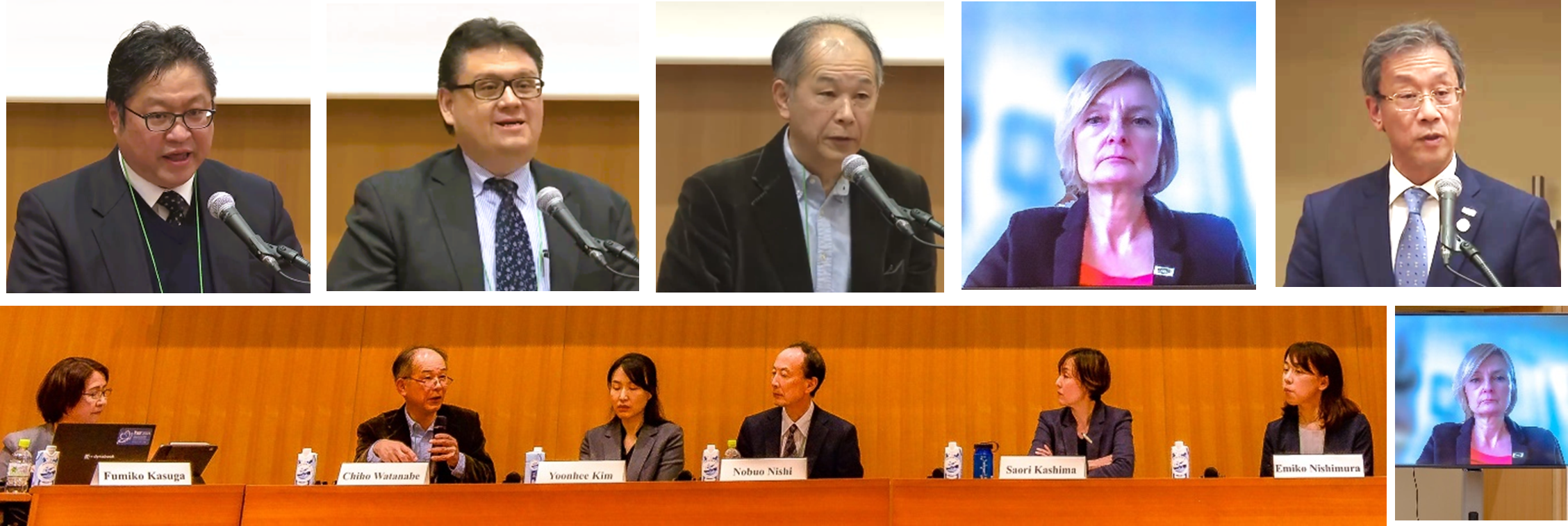Event report on the SDGs Symposium 2024 Planetary health for Sustainability: Towards transformative solutions for a Healthy Planet

The University of Tokyo held jointly with Springer Nature a symposium on the interface of Planetary Health and Sustainable Development Goals (SDGs) on 27 February 2024. This was the fifth SDGs Symposium by the University of Tokyo and Springer Nature, following four symposia in 2019, 2021, 2022 and 2023. Based on past decisions, there has been a shift in the SDGs focus for each symposium. The 2024 symposium focused on “Good Health and Wellbeing” (SDG3) and its intersections with other SDGs. This reflected the consensus between the organizing teams that rapid environmental change observed globally has important ramifications for human and ecosystem health and sustainability. In this context, there are growing calls to develop and implement inclusive actions to transform human activities for the benefit of human and ecosystem health. Such examples include dietary change and food system transformation to achieve healthy diets, but also mitigate climate change, reduce pollution and curb biodiversity loss. Such transformative actions require transdisciplinary research to shape conversations within academic communities and the wider public.
To reflect these realizations, the 2024 SDGs Symposium brought together leading researchers in Japan working on different aspects at the interface of environmental change, public health, and sustainability. There was special attention to inclusivity among the speakers in terms of disciplines, affiliation, gender, and stage of the career.
The Opening Remarks were jointly delivered by Prof. Kensuke Fukushi (Director, Institute for Future Initiatives, University of Tokyo) and Dr. Antoine Bocquet (Managing Director, Springer Nature Japan). They set the tone of the 2024 SDGs Symposium, emphasizing that strong links between human health and environmental change cause grave concerns that planetary health is in deep peril. This possible compromise of the health of human civilization and the state of the natural systems upon which we depend will have grave consequences for ourselves and future generations.
In the first Keynote Presentation, Prof. Chiho Watanabe from Nagasaki University provided definitions and conceptualizations of Planetary Health. Furthermore, Prof. Watanabe touched on possible approaches to identify solutions through local interdisciplinary and transdisciplinary collaborations. Subsequently, Dr. Magdalena Skipper, editor in chief of Nature, highlighted the current progress at the mid-point towards the 2030 horizon and implications for Planetary Health. She outlined some considerations for ensuring that planetary health research is adopted by practitioners and policymakers to create actual impact.
The four Plenary Presenters outlined different critical issues related to interactions between environmental change and human and ecosystem health and their implications for sustainability. First, Prof. Yoonhee Kim from the University of Tokyo outlined current research on health risks and adaptation to heat exposure in cities, using Japanese cities as an example. Subsequently, Prof. Nobuo Nishi from St. Luke’s International University, highlighted how and why dietary transformation is essential for enhancing planetary health, and how system dynamics can be used to unravel underlying mechanisms and design possible interventions. Prof. Saori Kashima from Hiroshima University critically discussed the need for a transdisciplinary shift in planetary health research, highlighting how it can be used to identify community-oriented healthy aging activities. Ms. Emiko Nishimura from the Japan International Cooperation Agency (JICA) outlined JICA’s approach to planetary health, highlighting major international projects on improvement of waste management systems and food system transformation.
Given the very broad nature of the concept of planetary health, the thematic focus of each Keynote and Plenary presentation was deliberately selected to reflect different aspects of the interface between environmental change and human/ecosystem health using different disciplinary lenses. This created an overview of major observed patterns, research challenges and key research priorities at this interface.
Finally, Prof. Fumiko Kasuga from Nagasaki University coordinated a panel discussion consisting of all speakers. This panel discussion provided insights based on the experience of the speakers engaging with different elements of the interface between cities and the SDGs. The main topics that were discussed during the Panel included (a) how transdisciplinarity for planetary health can be promoted; (b) what are important considerations to design and implement inclusive solutions to enhance planetary health considering inequality within and between societies, (c) what can be the implications of artificial intelligence for planetary health, and (d) how to integrate insights from the youth and marginalized groups in planetary health research.
The Symposium concluded with the Closing Remarks provided by President Teruo Fujii of the University of Tokyo. The remarks focused on major ramifications of current human activity for planetary health, why transdisciplinary approaches are critical to develop appropriate responses, and major relevant initiatives currently implemented within the University of Tokyo.
Of the 1134 registered participants, 591 participants from around the world attended the 2024 SDGs Symposium. A basic breakdown of the participants shows that 71 attended in person, and 520 attended online from 49 countries. Approximately 70% of the online audience joined from Japan and 30% from other countries. Some of the best represented countries include India (34 participants), Nigeria (12 participants), Pakistan (8 participants), and China and Malaysia (each 7 participants). Beyond academic and research institutions, many participants were affiliated with the private sector, government agencies, and civil society, suggesting the transdisciplinary appeal of the event. A large number of registrants were students and early career researchers, though the actual numbers that attended cannot be estimated accurately with the information tracked during the event.
Following the SDGs Symposium, a networking and poster session was held, where undergraduate and postgraduate students from the University of Tokyo and other Japanese universities presented their work to the speakers and the participants. In total, 9 posters capturing different aspects of the SDGs research were presented: five posters from students of the University of Tokyo and four posters from students of other Japanese universities. Students had the opportunity to receive feedback and advice from the speakers of the Symposium.

Photography:
[Upper Column] From left, Director Fukushi and Dr. Antoine Bocquet (Managing Director, Springer Nature Japan), Professor Watanabe, Dr. Skipper, President Fujii
[Lower Column] Panel Discussion (from left, Professor Kasuga, Professor Watanabe, Professor Kim, Professor Nishi, Professor Kashima, Ms. Nishimura, Dr. Skipper)
To reflect these realizations, the 2024 SDGs Symposium brought together leading researchers in Japan working on different aspects at the interface of environmental change, public health, and sustainability. There was special attention to inclusivity among the speakers in terms of disciplines, affiliation, gender, and stage of the career.
The Opening Remarks were jointly delivered by Prof. Kensuke Fukushi (Director, Institute for Future Initiatives, University of Tokyo) and Dr. Antoine Bocquet (Managing Director, Springer Nature Japan). They set the tone of the 2024 SDGs Symposium, emphasizing that strong links between human health and environmental change cause grave concerns that planetary health is in deep peril. This possible compromise of the health of human civilization and the state of the natural systems upon which we depend will have grave consequences for ourselves and future generations.
In the first Keynote Presentation, Prof. Chiho Watanabe from Nagasaki University provided definitions and conceptualizations of Planetary Health. Furthermore, Prof. Watanabe touched on possible approaches to identify solutions through local interdisciplinary and transdisciplinary collaborations. Subsequently, Dr. Magdalena Skipper, editor in chief of Nature, highlighted the current progress at the mid-point towards the 2030 horizon and implications for Planetary Health. She outlined some considerations for ensuring that planetary health research is adopted by practitioners and policymakers to create actual impact.
The four Plenary Presenters outlined different critical issues related to interactions between environmental change and human and ecosystem health and their implications for sustainability. First, Prof. Yoonhee Kim from the University of Tokyo outlined current research on health risks and adaptation to heat exposure in cities, using Japanese cities as an example. Subsequently, Prof. Nobuo Nishi from St. Luke’s International University, highlighted how and why dietary transformation is essential for enhancing planetary health, and how system dynamics can be used to unravel underlying mechanisms and design possible interventions. Prof. Saori Kashima from Hiroshima University critically discussed the need for a transdisciplinary shift in planetary health research, highlighting how it can be used to identify community-oriented healthy aging activities. Ms. Emiko Nishimura from the Japan International Cooperation Agency (JICA) outlined JICA’s approach to planetary health, highlighting major international projects on improvement of waste management systems and food system transformation.
Given the very broad nature of the concept of planetary health, the thematic focus of each Keynote and Plenary presentation was deliberately selected to reflect different aspects of the interface between environmental change and human/ecosystem health using different disciplinary lenses. This created an overview of major observed patterns, research challenges and key research priorities at this interface.
Finally, Prof. Fumiko Kasuga from Nagasaki University coordinated a panel discussion consisting of all speakers. This panel discussion provided insights based on the experience of the speakers engaging with different elements of the interface between cities and the SDGs. The main topics that were discussed during the Panel included (a) how transdisciplinarity for planetary health can be promoted; (b) what are important considerations to design and implement inclusive solutions to enhance planetary health considering inequality within and between societies, (c) what can be the implications of artificial intelligence for planetary health, and (d) how to integrate insights from the youth and marginalized groups in planetary health research.
The Symposium concluded with the Closing Remarks provided by President Teruo Fujii of the University of Tokyo. The remarks focused on major ramifications of current human activity for planetary health, why transdisciplinary approaches are critical to develop appropriate responses, and major relevant initiatives currently implemented within the University of Tokyo.
Of the 1134 registered participants, 591 participants from around the world attended the 2024 SDGs Symposium. A basic breakdown of the participants shows that 71 attended in person, and 520 attended online from 49 countries. Approximately 70% of the online audience joined from Japan and 30% from other countries. Some of the best represented countries include India (34 participants), Nigeria (12 participants), Pakistan (8 participants), and China and Malaysia (each 7 participants). Beyond academic and research institutions, many participants were affiliated with the private sector, government agencies, and civil society, suggesting the transdisciplinary appeal of the event. A large number of registrants were students and early career researchers, though the actual numbers that attended cannot be estimated accurately with the information tracked during the event.
Following the SDGs Symposium, a networking and poster session was held, where undergraduate and postgraduate students from the University of Tokyo and other Japanese universities presented their work to the speakers and the participants. In total, 9 posters capturing different aspects of the SDGs research were presented: five posters from students of the University of Tokyo and four posters from students of other Japanese universities. Students had the opportunity to receive feedback and advice from the speakers of the Symposium.

Photography:
[Upper Column] From left, Director Fukushi and Dr. Antoine Bocquet (Managing Director, Springer Nature Japan), Professor Watanabe, Dr. Skipper, President Fujii
[Lower Column] Panel Discussion (from left, Professor Kasuga, Professor Watanabe, Professor Kim, Professor Nishi, Professor Kashima, Ms. Nishimura, Dr. Skipper)






